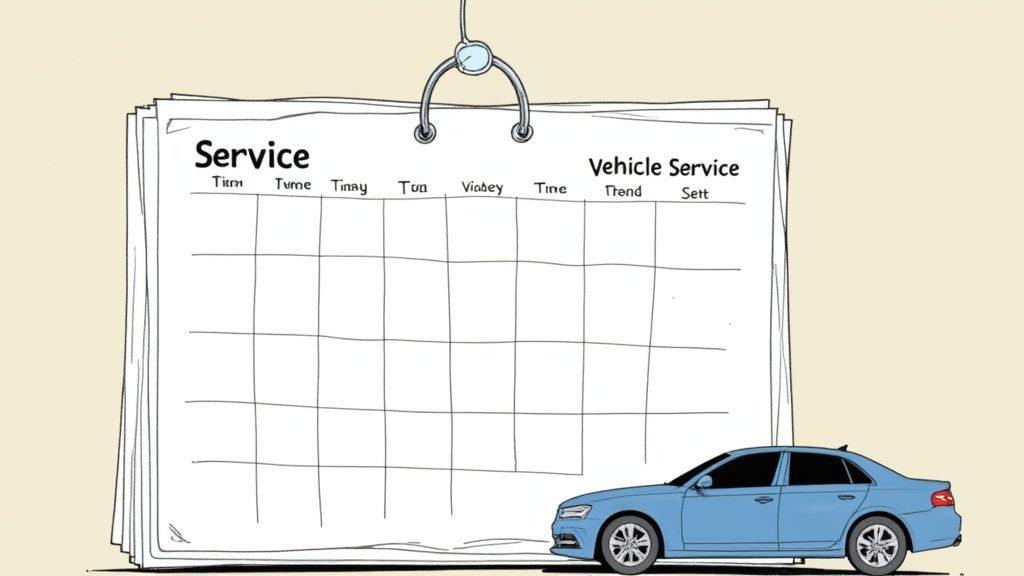
Log Book for Vehicle: Essential Maintenance Tips
Why Your Vehicle Log Book Is More Valuable Than You Think

Many vehicle owners dismiss the log book as just another piece of paperwork. However, a well-maintained log book is much more. It’s a valuable tool that can save you money, protect your vehicle investment, and even increase its resale value. It’s not just about tracking oil changes; it’s about creating a comprehensive vehicle history.
Protecting Your Investment and Warranty
A detailed vehicle log book is essential for warranty claims. Imagine a major component fails, and the manufacturer questions your adherence to the recommended maintenance schedule. Your log book acts as irrefutable proof, ensuring you receive the coverage you deserve, potentially saving you thousands in repairs.
A thorough record also helps identify and address minor issues before they become major problems. This proactive maintenance further protects your investment and keeps your vehicle running smoothly.
Maintaining a log book is crucial for personal and business use. It provides a comprehensive record of the vehicle’s operational history, including maintenance, repairs, fuel consumption, and mileage. This allows owners to track performance, ensure warranty compliance, and even boost resale value. You can learn more about vehicle log books at Simply Fleet.
Boosting Resale Value
When you decide to sell your vehicle, a meticulous log book becomes a powerful selling point. Consider two identical cars: one with a disorganized pile of receipts and the other with a neatly organized log book. The latter instills more confidence in potential buyers.
A well-documented history provides evidence of responsible ownership. It shows the vehicle has been properly cared for, increasing its perceived value and giving you an edge in the used car market. This tangible proof of care can translate into a higher selling price.
Preventing Fraud and Disputes
Not all mechanics are trustworthy. A detailed log book protects you from fraudulent charges or unnecessary repairs. With a clear record of past services, you can identify discrepancies and question any recommended repairs that seem out of line.
This empowers you to make informed decisions and avoid being taken advantage of. Your log book acts as a shield against unscrupulous practices, providing a foundation for negotiating fair prices and ensuring you only pay for necessary work.
The Psychology of Consistent Documentation
Beyond practical benefits, maintaining a log book influences the psychology of ownership. Documenting each service reinforces pride and care in your vehicle. This encourages proactive maintenance, leading to better performance and longevity.
For many, this documentation becomes a ritual, a tangible connection with their vehicle. It’s a small time investment that yields substantial long-term returns, saving money and preventing future headaches.
Critical Components Every Vehicle Log Book Must Include

A vehicle log book is much more than a simple record of oil changes. It’s a detailed history of your vehicle’s maintenance and can significantly impact its resale value. Understanding what information to track is essential for an effective log book. Professional mechanics often go beyond the basics, meticulously documenting details that many vehicle owners might miss.
Essential Maintenance Records
The core of any good vehicle log book starts with tracking routine maintenance. This includes oil changes, replacing filters (air, oil, and fuel), and tire rotations. Keeping a record of fluid top-offs, like brake fluid, coolant, and power steering fluid, provides a more complete view of your vehicle’s health. This practice can help you identify potential leaks or unusual fluid consumption before they become major problems.
Repairs and Part Replacements
A truly robust log book goes beyond routine maintenance to include all repairs and part replacements. Documenting the date of service, the specific parts replaced, the cost, and the name of the mechanic or shop is essential. This detailed record is particularly useful for warranty claims, as it offers proof of required maintenance and repairs, potentially saving you significant money.
Fuel Consumption and Mileage
Tracking your fuel consumption and mileage offers valuable insights into your vehicle’s efficiency. Over time, you’ll be able to identify changes in fuel economy that could signal underlying mechanical problems. These records can also help you budget for fuel costs and adjust your driving habits to improve gas mileage.
Additional Information for a Complete Record
To make your log book even more comprehensive, consider including additional details. This might include tire pressure checks, battery replacements, and even windshield wiper changes. These seemingly minor details contribute to a complete picture of your car’s maintenance history. A complete record can be particularly helpful when diagnosing intermittent problems or when filing insurance claims. For more tips, check out this helpful resource: How to master your vehicle documentation.
The table below outlines key components to include in your vehicle log book. It highlights the essential information categories, along with the purpose and benefit of tracking each type of data.
Essential Log Book Components
| Component | Information to Record | Benefits |
|---|---|---|
| Routine Maintenance | Date, service performed, mileage, cost, service provider | Warranty compliance, preventative maintenance, identification of potential issues |
| Repairs/Replacements | Date, parts used, cost, service provider | Warranty claims, accurate vehicle history, cost tracking |
| Fuel/Mileage | Date, gallons purchased, cost, mileage, total cost | Fuel efficiency tracking, budgeting, identifying potential problems |
| Additional Info | Date, service performed, cost, service provider | Complete vehicle history, diagnostic assistance, insurance claims support |
By consistently tracking these components, your log book becomes a valuable tool. It protects your investment, simplifies maintenance, and ultimately increases your vehicle’s value.
Digital vs. Physical Log Book for Vehicle: Which Wins?

Maintaining comprehensive vehicle records is essential for every owner. But choosing between a digital or physical log book can be tricky. Each method presents its own set of advantages and disadvantages, catering to different preferences. So, which method comes out on top?
Weighing the Pros and Cons of Each Method
Physical log books offer a tangible, readily accessible history of your vehicle’s maintenance, even without internet. This traditional approach can provide a sense of security in having a physical record. However, paper log books can be easily misplaced, damaged, or become difficult to manage as records pile up.
Digital log books provide convenient access to information and simplified backups. Platforms like Auto Service Logger offer automated reminders, detailed reporting, and secure cloud storage. Recording every service or repair helps monitor your vehicle’s maintenance schedule and identify potential issues early. This proactive approach can save money by preventing major breakdowns. For more insights on vehicle maintenance, check out this helpful guide: Guide to Vehicle Log Book. However, digital systems rely on technology and can be vulnerable to glitches, data breaches, or software becoming outdated.
Combining the Best of Both Worlds: A Hybrid Approach
Many vehicle owners opt for a hybrid approach, leveraging the strengths of both physical and digital systems. They might keep physical receipts and documents as backups while using a digital platform for organization and accessibility. This strategy provides redundancy and safeguards important data against potential loss.
Transitioning to a Digital Log Book
Moving from a physical to digital log book may seem daunting, but it can be a smooth process.
- Organize your existing paper records.
- Choose a digital platform that fits your needs.
- Systematically input your historical data to create a comprehensive digital archive.
Selecting the Right System For Your Needs
The best choice ultimately depends on individual needs and preferences. Consider your comfort level with technology, the complexity of your vehicle’s maintenance, and the level of detail you want in your records. To help you decide, the table below outlines the key differences between physical and digital log books.
To make the best decision for your vehicle log book needs, let’s compare the two main options.
Digital vs. Physical Log Books
| Feature | Physical Log Book | Digital Log Book |
|---|---|---|
| Accessibility | Requires physical presence | Accessible from any device with internet access |
| Security | Vulnerable to physical damage and loss | Susceptible to data breaches and technical issues |
| Organization | Can become disorganized with large volumes | Easy to organize and search |
| Backup | Difficult to backup | Easy to backup and store in the cloud |
| Reminders | Manual reminders required | Automated reminders and notifications |
| Cost | Low initial cost, can incur storage costs | Subscription fees or one-time purchase cost |
This table summarizes the core differences between physical and digital vehicle log books, highlighting the strengths and weaknesses of each approach. By carefully considering these factors, you can choose the method that best suits your record-keeping style and ensures your vehicle stays in top condition.
Building a Vehicle Log Book System That Actually Works

Maintaining a consistent vehicle log book is a common challenge. While many start with the best of intentions, these often fade over time. This section explores the practical hurdles and offers solutions for creating a sustainable system that fits seamlessly into your routine.
Understanding the Psychology of Documentation
Effective documentation isn’t simply about the right tools. It’s about establishing good habits. Vehicle owners who successfully maintain their log books often approach it with a sense of ritual, connecting them to their vehicle’s history. This mindful practice transforms a chore into something enjoyable. A well-maintained log book also provides important documentation for tax purposes or when selling your vehicle. You can learn more about this on the Simply Fleet Blog.
Integrating Documentation into Your Routine
The secret to a successful vehicle log book is integrating it into your regular maintenance routine. Schedule time to update it just as you schedule oil changes. This prevents a backlog and keeps your records accurate.
- Immediate Recording: Record every service or repair immediately. Don’t rely on your memory.
- Designated Space: Keep your physical log book in a dedicated spot, or ensure easy access to your digital log book.
- Regular Review: Review your log book periodically to identify trends, anticipate future maintenance, and gain insights into your vehicle’s performance.
Frameworks for Different Owner Types
Different vehicle owners have different needs. Some may prefer a minimalist approach, while others need a more comprehensive system.
The Minimalist Log Book
This approach focuses on essential details:
- Date of Service
- Type of Service or Repair
- Mileage
- Cost
The Comprehensive Log Book
This system includes all the minimalist information, plus:
- Specific Parts Replaced
- Service Provider Details
- Fuel Consumption and Mileage Data
- Any other relevant notes (e.g., tire pressure checks, battery changes)
Digital Tools for Streamlined Documentation
Digital tools like Auto Service Logger can significantly simplify the process. These tools often provide:
- Automated Reminders
- Secure Data Storage
- Easy Access to Historical Data
- Detailed Reporting Features
Turning Documentation from Chore to Ritual
By understanding your own style and utilizing the right tools, you can create a vehicle log book system that truly works. This transforms a potentially tedious task into a beneficial practice, saving you time, money, and stress in the long run. It also becomes a valuable asset for effectively managing your vehicle’s health.
Business Vehicle Log Books: Beyond Basic Compliance
For business owners, a vehicle log book is more than just a record-keeping chore; it’s a vital tool for financial health and legal protection. Meticulous documentation goes beyond simple compliance, directly impacting your bottom line.
Tax Implications and Deductions
Properly maintained log books are essential for maximizing tax deductions related to business vehicle use. They provide the necessary proof to substantiate claims, especially in the event of an audit. Without comprehensive records, deductions for fuel, maintenance, and depreciation are often challenged, potentially leading to penalties and back taxes. Accurate documentation is key to minimizing tax liabilities and avoiding costly disputes with tax authorities.
Protecting Your Business During Audits and Claims
Imagine facing an audit without detailed vehicle logs. Proving business use becomes incredibly difficult, leaving your deductions vulnerable. Similarly, a comprehensive log book can be invaluable evidence in insurance claims, demonstrating regular maintenance and responsible vehicle use. A well-maintained log book strengthens your position and can significantly influence the outcome of these situations, acting as a shield against financial losses by providing the supporting documentation for your claims. Learn more in our article about How to Master Your Vehicle Documentation.
Documentation Standards Across Industries
Different industries have varying documentation requirements. Transportation companies, for example, face stricter regulations than businesses using vehicles solely for local errands. Understanding these industry-specific standards is crucial for ensuring full compliance and avoiding potential penalties. This knowledge allows businesses to tailor their log book systems to meet their specific needs and obligations.
Managing Multiple Drivers Per Vehicle
Businesses often have multiple employees using the same vehicle. This adds complexity to log book management. Implementing a system that tracks mileage, driver details, and the purpose of each trip becomes crucial for effective record-keeping. Such a system can also help monitor driver behavior, improving efficiency and promoting safe driving practices.
Streamlining Documentation With Digital Systems
Digital log books for vehicles are transforming business compliance. They offer automated tracking, simplified reporting, and secure data storage. These systems provide a centralized platform for managing all vehicle-related information, improving efficiency and reducing the risk of errors associated with manual record-keeping. Digital solutions offer a robust and efficient way to maintain accurate and accessible records, streamlining the documentation process.
Templates and Strategies for Effective Documentation
Developing clear vehicle use policies for employees is fundamental. This policy outlines permitted uses, documentation procedures, and responsibilities, ensuring everyone is aligned. Combined with user-friendly templates for logging trips and expenses, businesses can create a system that is both effective and easy to follow. Streamlining the process and providing clear guidelines fosters a culture of consistent and accurate record-keeping. This proactive approach significantly enhances their tax and legal protection, reducing administrative burden and allowing employees to focus on their core responsibilities while maintaining compliant records.
Leveraging Vehicle History Reports as Retroactive Log Books
A vehicle log book diligently records a car’s maintenance and repairs. But what if you buy a used car with incomplete records, or none at all? That’s where vehicle history reports come in handy. They serve as a retroactive log book, offering a peek into the vehicle’s past. However, it’s important to understand their limits and how to interpret them correctly.
Decoding the Secrets Within Vehicle History Reports
Vehicle history reports gather information from many sources, including DMVs, insurance companies, and repair shops. They can uncover important details such as accident history, title status (salvage, rebuilt, etc.), and recorded odometer readings. For instance, a report might reveal whether a vehicle was in a major accident, had its odometer tampered with, or was previously a rental or police car. Kelley Blue Book offers more information on vehicle history reports. This information is invaluable for evaluating a used vehicle’s actual condition and estimating potential future costs.
Beyond the Basics: Insights from the Pros
The raw data in a history report is helpful, but knowing how to analyze it is critical. Experienced vehicle inspectors and dealership managers often look beyond the obvious, searching for patterns and inconsistencies. They might notice discrepancies in reported mileage or a series of repairs related to a particular system, which could point to underlying issues.
Identifying Red Flags and Negotiation Leverage
Spotting red flags in a vehicle history report can empower you during price negotiations. A history of serious accidents or title problems can significantly affect a vehicle’s market value. You can use this information to negotiate a lower purchase price or to walk away from a potentially troublesome vehicle. A salvage title, for example, often indicates extensive damage, potentially leading to high repair costs down the road.
Filling the Historical Gaps and Verifying Accuracy
After purchasing a used vehicle, consider filling in any missing history. Contact previous owners (if you can) or the service centers listed in the report to get more detailed service records. Confirming the accuracy of the report is also essential. Errors do occur, and sometimes vital information gets overlooked. Verifying and supplementing the report helps create a more complete log book for your vehicle. For more on vehicle documentation, see How to master vehicle documentation.
Integrating Historical Data into Your Ongoing Log Book
After gathering as much historical information as possible, incorporate it into your current vehicle log book. This creates a continuous record of ownership, maintenance, and repairs. Whether using a paper log book or a digital platform like Auto Service Logger, this historical data provides valuable insight for future maintenance choices and can even increase the car’s resale value.
Ready to manage your vehicle maintenance records effectively? Start a free trial with Auto Service Logger and enjoy the peace of mind that organized vehicle records provide.